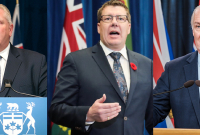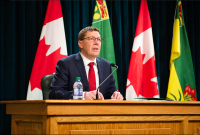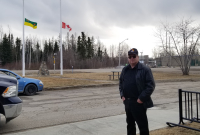Support strong Canadian climate journalism for 2025
Premier Scott Moe and chief medical officer Saqib Shahab reported 60 new cases of COVID-19 in Saskatchewan on Wednesday, marking the highest one-day total in cases to date.
Moe said most of these cases have been due to an ongoing outbreak impacting Hutterite communities in southwest and west-central Saskatchewan.
“This large number of cases was the result of the aggressive testing and the contact tracing that the Saskatchewan Health Authority has been doing in a number of Hutterite communities in the province,” Moe said.

Of the 60 cases reported Wednesday, 48 are from colonies in the southwest and west-central regions. Forty-three of those are in a single communal living setting in the rural municipality of Lawtonia, southwest of Regina.
Moe said at the briefing that a successful response to outbreaks in the south of the province will look a lot like it did for northern Saskatchewan, where active cases have dropped.
Moe and Shahab told Canada’s National Observer the community engagement in northern Saskatchewan that led to a decrease in cases shows how it can be done successfully in the south.

Moe pointed to a significant drop in cases in northern communities such as La Loche, which was the epicentre of an outbreak and reported last week that there are no more active cases in the community.
He said his government’s success in controlling the spread of the virus has been due to ensuring public access to good health information and the “goodwill and compliance of Saskatchewan people on following all of the safety guidelines that have been put forward.”
“That is precisely how the community of La Loche and its neighbouring communities were able to get their outbreak under control, and that is how we’ll get this latest outbreak under control,” Moe said.
Montreal Lake Cree Nation, between Prince Albert and La Ronge, declared a “total lockdown” on July 10. The lockdown is set to lift Friday.

“I would just applaud the leadership in Montreal Lake because … they had taken very swift action with respect to educating the community on the public health recommendations and they had very swiftly moved to limiting travel in and out of that community,” Moe said.
Shahab said that many smaller northern communities have been successful in dealing with the pandemic because of community support.
“Public health and the community should support you and your family members in terms of if you and your family members have to isolate (that) your needs are being met,” he said.
“Many northern and small communities have done that… Neighbours and others supporting families if they chose to seek that support. That’s really helped sporadic cases … from becoming bigger outbreaks.”

Shahab noted that the south and east-central regions of the province had reported no cases of the virus for three months, and now suddenly are seeing an increase. He called it a “reminder for all of us that anywhere in Saskatchewan, the basic principles apply.”
He said that following public health guidelines is the best way to prevent cases from becoming outbreaks.
The 60 new cases announced Wednesday put the total case count for Saskatchewan at 1,030. Fifty of the new cases are in the south, four in Saskatoon, three in central, two in the far north and one in the north.

Moe and Shahab made the point that communities where outbreaks happen shouldn’t be stigmatized and that testing positive for coronavirus isn’t something to be ashamed of.
“No one should feel concerned when they seek testing that they’ll get stigmatized or they’ll get blamed for getting COVID. It’s no one’s fault, so people should feel comfortable to seek testing wherever you live and then isolate if you’re symptomatic right away, even before you get tested,” Shahab said.
Moe said his government is taking a collaborative approach to mitigating the outbreak in the southern parts of the province and particularly in Hutterite communities.
“We always work with the local leadership on whatever challenge we may be faced with."
COVID-19 testing is now available to anyone who requests it — if they have symptoms or not.
A referral for testing can be made by contacting HealthLine 811.
General inquiries can be directed to [email protected].
The most up-to-date version of the Re-Open Saskatchewan plan can be found on the government’s website at www.saskatchewan.ca/re-open.
Michael Bramadat-Willcock/Local Journalism Initiative/Canada's National Observer



















Comments